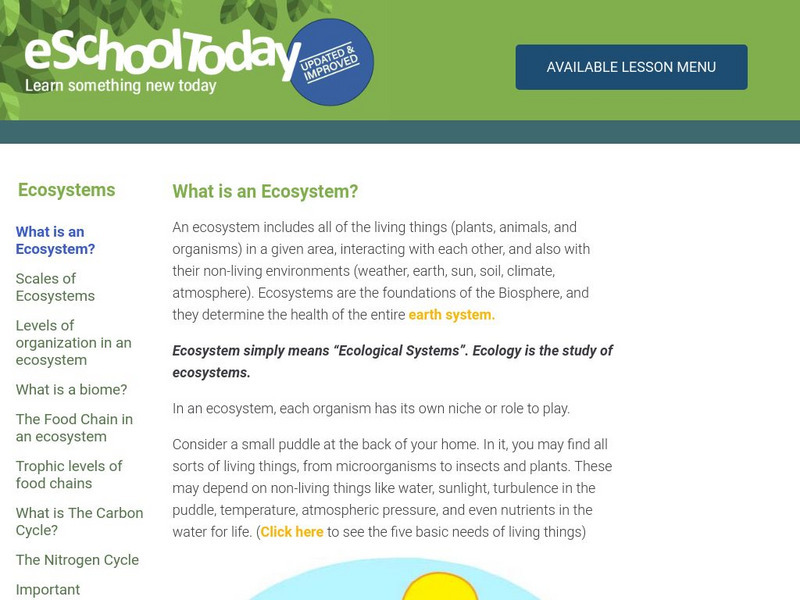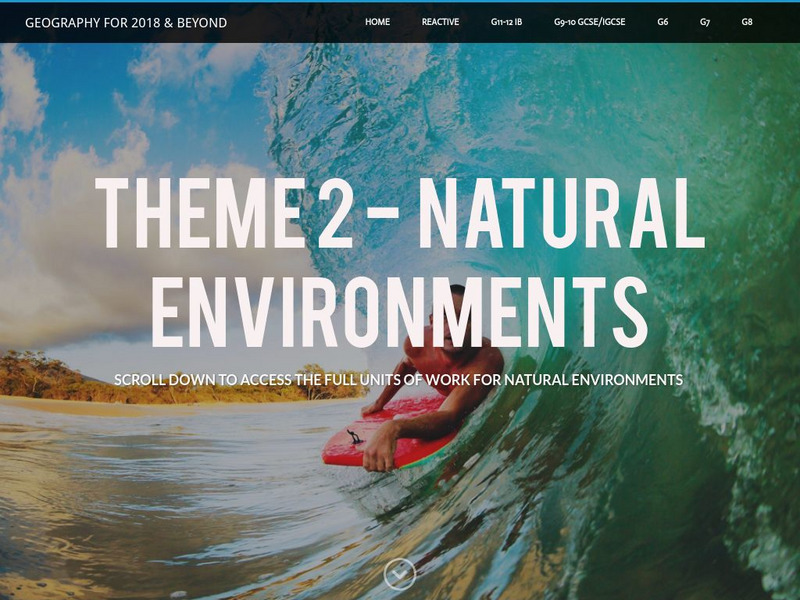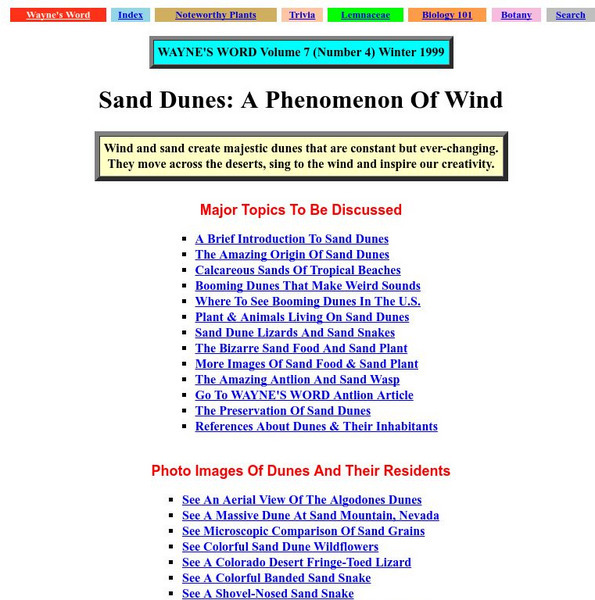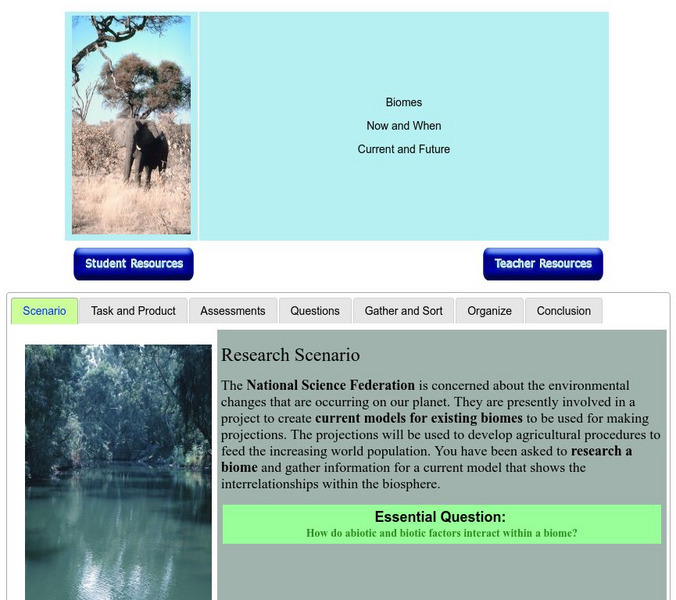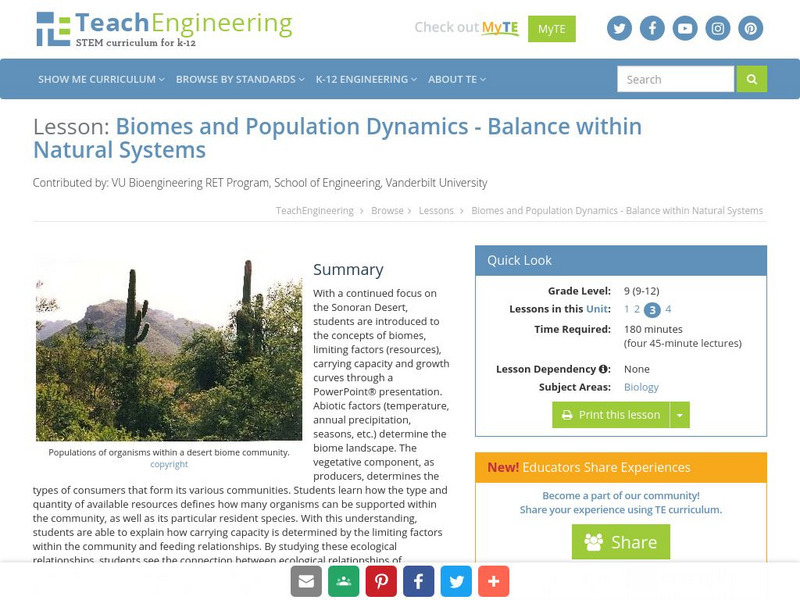Curated OER
Who's for Dinner?
Fifth graders examine life systems within different biomes. They choose paper plates with the names of animals on them. They research the animals, write reports and draw pictures of them. They create a food chain model by arranging the...
Curated OER
A Biome to Call Home
Students research, present, and compare information about the features of seven biomes that exist in the U.S. They view and discuss the images on the Arkansas state quarter, conduct research on the biomes, and create a poster of the...
Curated OER
Terrestrial Communities
Students watch a video about different terrestrial communities. They conduct an experiment with sponges conserving water. They research desert characteristics comparing them with other biomes.
Curated OER
Ecosystems
Sixth graders perform various labs, create presentations, and do hands on activities to explore the ecosystem.
Curated OER
Species and Spaces - At Risk at Home
Eleventh graders explore and compare Canadian biomes and investigate species at risk. They describe population growth and eco-regions in terms of climate and geography. They research and create presentations about the natural history and...
Curated OER
Home on the Biome
Fifth graders study six major biomes, graph temperature and rainfall, and present their findings to the class.
Curated OER
The Needs of Living Things
Learners watch video clips of animals and plants in their natural environment, to gather evidence that all living things have basic survival needs. Students draw pictures of real or imaginary pets eating, drinking, breathing, and taking...
eSchool Today
E School Today: What Is an Ecosystem?
Learn about all the different levels of ecosystems, from the living things under a rock, up to a rainforest biome. Explains the levels of organization within an ecosystem, the different types of biomes, food chains and trophic levels,...
The Wild Classroom
The Wild Classroom: Biomes of the World: Arctic Tundra Biome
Learn all about the Arctic Tundra Biome. This site discusses where it is found, temperatures, precipitation, soil, plants and animals. It also has a few videos to view.
Geographypods
Geographypods: Theme 2: Natural Environments
A rich collection of highly engaging learning modules on topics related to the natural environment. Covers four main areas - plate tectonics, forms and processes, weather and climate, and rainforest and desert. Within each of these,...
University of California
Ucmp: The World's Biomes
This is an introduction to the major biomes on Earth. This page groups biomes into five major types: aquatic, deserts, forests, grasslands, and tundra. Information on climate, animal/plant life, and much more is given for each of type...
Palomar Community College District
Wayne's Word: Sand Dunes: A Phenomenon of Wind
An engaging natural history of sand dunes. From beaches to deserts you will learn about the formation and ecology of these ecosystems.
Other
Baltimore County Public Schools: Biomes: Now and When (Online Research Model)
Biomes lesson designed to answer the question, how do abiotic and biotic factors interact within a biome? integrates biological concepts with literacy knowledge and skills. Includes directed questions, assessment guides, project...
Other
Eco Library: Panoramas
Features amazing 360 degrees interactive panoramas for students to help them better understand ecological variation on our planet. Searchable by biome/ecosystem type, location, or ecological phenomena they depict.
The Wild Classroom
The Wild Classroom: Biomes
This excellent resource explores all of the biomes found on planet Earth! A side menu indicates the world's biomes and provides details on each. Colorful interactive maps, video clips, lesson plans, species profiles, and so much more...
Nature Conservancy
The Nature Conservancy: From America's Rainforest to America's Desert
On this virtual field trip, teachers will help their students travel to the lush, rain-soaked splendor of the Olympic Peninsula and explore the urban watershed of Seattle. Next, they will head to Arizona's dry, desert landscape and take...
CK-12 Foundation
Ck 12: Episd: Terrestrial Biomes
[Free Registration/Login may be required to access all resource tools.] Recognize and explore the variety of terrestrial biomes and understand the differences among them.
TeachEngineering
Teach Engineering: Biomes and Population Dynamics
This lesson begins with a PowerPoint slideshow that covers important ecological concepts about biomes, limiting factors, carrying capacity, and population growth. Learners will look at the population dynamics involved with the diversity...
BBC
Bbc Nature: Wildlife: Swamp
Take a close-up look at the world of swamps and discover what lives and grows there through pictures, descriptions, and external links. Listen to the various sounds made in swamps in different locations.
BBC
Bbc Nature: Wildlife: Lakes and Ponds
Take a close-up look at the world of lakes and ponds and discover what lives and grows there through pictures, news, descriptions, and external links.
BBC
Bbc Nature: Wildlife: Tundra
Explore the fascinating world of the tundra biome and discover what lives and grows there through videos, pictures, and external links. Listen to the various sounds made in a tundra.
Enchanted Learning
Enchanted Learning: Biomes
Discover the hidden treasures in the different habitats on the earth! The earth is filled with many biomes. Examples of different biomes are listed and include hyperlinks to additional information such as the animals found there.
Science Buddies
Science Buddies: Home Sweet Biome: How Do Plants Grow in Different Environments?
In this science fair project you will learn about biomes and how different climatic conditions affect plant growth. This can explain why some plants and animals are similar in different areas of the country, and in other parts they are not.
Georgia Department of Education
Ga Virtual Learning: Biology: Ecology Ii
Through a series of multi-media learning activities, students will assess the dependence of all organisms on one another and the flow of energy and matter within their ecosystems.









